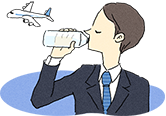Study on water vs. an electrolyte beverage for prevention of traveller's thrombosis
Study outline
Fluid intake is very important in preventing traveller's thrombosis (economy class syndrome), which can occur during prolonged periods spent seated, such as when on an airplane.
Otsuka Pharmaceutical conducted a study in which it chartered an airplane and flew 40 volunteer staff members from Japan to the USA in order to research the relationship between traveller's thrombosis and rehydration. In the study, subjects were divided into two groups of 20: a group drinking a beverage containing electrolytes and carbohydrates, and a group drinking mineral water. During the nine hour flight, both groups drank the same amount at the same times.
Study details
| Objective | To investigate the effect that fluid intake has on fluid balance and blood viscosity in the lower legs during a long flight |
|---|---|
| Study design | Open-Label, parallel-group comparison study |
| Schedule | Depart Narita Airport, Japan at 21:30. Arrive at Moses Lake Airport, USA at 06:30 (9 hour flight) |
| Subjects | 40 healthy adult males no older than 40 years old (average age: 23.4, average weight: 61.3kg, average height: 172.5cm) |
| Group composition |
|
| Notes |
|
Detailed schedule

Study results
Even though the total intake volume during the flight within both groups was the same, the total urine volume in the electrolyte beverage group was significantly less than that of the mineral water group (Fig. 1).
As indicated, the percentage of the fluid volume retained in the body against total intake volume during the flight in the electrolyte beverage group was significantly higher than the mineral water group (48% vs 28%) (Fig. 2).
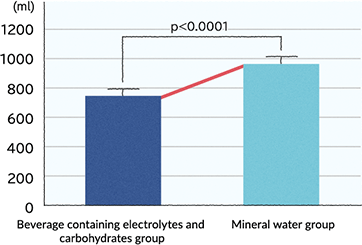
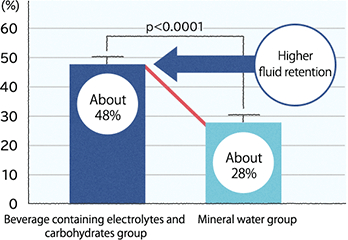
Additionally, the plasma volume in the electrolyte beverage group increased during the flight, however that of the mineral water group didn't change. The viscosity of venous blood collected from the feet after the flight in the electrolyte beverage group was lower than that of the mineral water group, but there was no difference between the two groups in that collected from the arms. (Fig. 3 and 4).
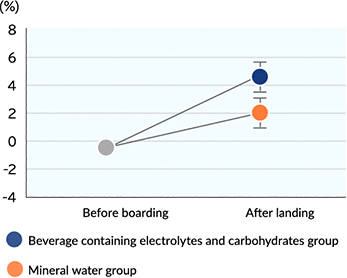
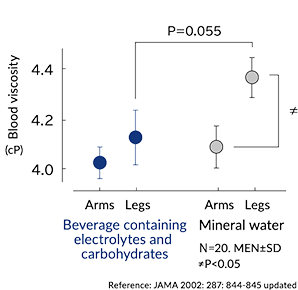
Use an electrolyte beverage for effective hydration
In this study, a difference in changes in blood viscosity between the two groups during the long flight was detected. These results suggest that an electrolyte beverage is more effective than mineral water for hydration under conditions such as when taking a flight.
When you sit for a long time, such as when in a vehicle or doing office work, maintain normal blood flow by moving your lower legs at regular intervals. Also, hydrate your body effectively with a beverage containing electrolytes and carbohydrates.
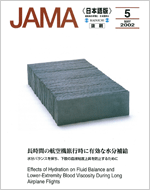
The contents of this study have been mentioned in the American Medical Journal "JAMA" by Dr. Zeniya and his team at the The Jikei University School of Medicine






